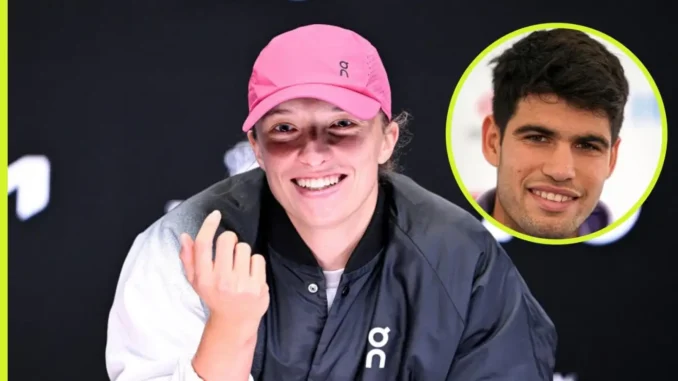
As the tennis world converges on Montreal for the 2025 Canadian Open, world No. 2 Iga Swiatek has opened up about the profound influence of Carlos Alcaraz, the ATP’s No. 2 and a five-time Grand Slam champion, whose infectious joy on the court has become a beacon for her own game. Fresh off a historic Wimbledon triumph, where she demolished Amanda Anisimova 6-0, 6-0 to claim her sixth major title, Swiatek is candid about her desire to emulate Alcaraz’s ability to find delight in the sport amidst its relentless pressures. “I wish I was more like Carlos because I have got to say he is a big inspiration in terms of that,” Swiatek said in a pre-tournament press conference, her words resonating with a sincerity that reflects her introspective approach to her career.
Swiatek, a 24-year-old Polish superstar, has long been a dominant force, with a 6-0 record in Grand Slam finals and a staggering 22 professional titles, including four French Open crowns and a US Open. Yet, despite her unrivaled success, she admitted to struggling with the mental toll of professional tennis. “He always says that the most important thing for him on a tennis court is to enjoy it and have fun, and I sometimes forget about that,” she confessed, highlighting Alcaraz’s ability to maintain a childlike enthusiasm under the weight of expectations. The Spaniard, just one year her junior, has captivated the sport with his dynamic play and unrelenting positivity, traits that Swiatek finds both inspiring and elusive. “Sometimes with all the pressure around and things we need to do off the court, you need to remind yourself about this kid that started playing tennis instead of winning for somebody and having this baggage on your shoulders,” she added, underscoring the mental reset Alcaraz’s mindset offers.
The 2025 season has been a rollercoaster for Swiatek. Her Wimbledon victory, a double bagel that echoed Steffi Graf’s 1988 French Open final, marked her first grass-court major and silenced doubts about her versatility. However, earlier setbacks, including a semi-final loss to Mirra Andreeva at Indian Wells, a quarter-final exit to Alexandra Eala in Miami, and a heart-wrenching Australian Open semi-final defeat to Madison Keys, exposed vulnerabilities. “I learned a lesson in my last match in Australia. I realize I have to be energetically there on the court and run a little bit more, [and] give more,” Swiatek reflected earlier this year, a mindset shift that fueled her clay and grass campaigns. Her admiration for Alcaraz, who clinched Roland Garros 2025 and reached the Wimbledon final only to fall to Jannik Sinner, stems from his ability to bounce back from setbacks with a smile. “For sure, when Carlos shows that and when he speaks about that, it is always a good reminder for me, and I try to do that as well, but without me working on it, I think my mind would automatically go to just working, working, working,” she said, acknowledging her tendency to prioritize grind over joy.
Alcaraz’s influence extends beyond his on-court demeanor. His technical prowess, particularly his masterful drop shot, has also caught Swiatek’s attention. After her 6-2, 6-2 rout of Jana Fett at the Stuttgart Open, she admitted to envying his finesse. “If I haven’t been doing that since I’m a kid, like Carlos, for example, then it’s a bit harder to force it, you know, later on. So, yeah, I want to try because this is the only way to improve that and to learn how to do that,” she said, signaling her intent to diversify her game. This technical aspiration complements her mental goal of embracing Alcaraz’s carefree approach, a balance she hopes to strike as she navigates the grueling North American hard-court swing.
Swiatek’s Canadian Open campaign begins against Yulia Putintseva or Guo Hanyu, with a potential second-round clash against Emma Raducanu looming. The tournament, part of the WTA 1000 series, offers Swiatek a clean slate, as she has no points to defend from 2024, unlike rivals like Jessica Pegula, who faces pressure to maintain her ranking. Alcaraz, meanwhile, withdrew from Montreal to recover from “small muscle issues,” a decision Swiatek respects as she manages her own physical demands. “I think I liked playing these shorter tournaments because physically I was always more efficient,” she noted, expressing a preference for less taxing events. Her comments reflect a player striving to balance performance with well-being, a lesson she’s learning from Alcaraz’s ability to “accept everything that is coming to me in the way it comes.”
As Swiatek and Alcaraz chase career Grand Slams—both needing only the Australian Open to complete the set—their parallel journeys highlight a shared pursuit of greatness. Swiatek’s openness about her struggles and her admiration for Alcaraz’s joy underscore a human side to her dominance, making her a relatable figure for fans. With the US Open on the horizon, Swiatek’s quest to channel Alcaraz’s spirit could be the key to unlocking her full potential, blending her relentless work ethic with a rediscovered love for the game.
Leave a Reply